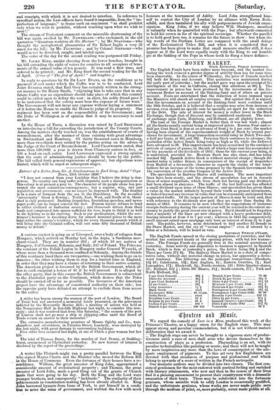A writer like Plutarch might run a pretty parallel between
the Xing who signed Magna Charta and the Minister who moved the Reform Bill in the House of Commons. Even the fortunes of their houses have a re- semblance. William, the great ancestor of Bing John, appropriated a Considerable amount of ecclesiastical property ; and Thomas, the great ancestor of Lord John, made a good thing out of the grants of Church lands that were going in his day. Both the King and the Lord were younger brothers, and consequently " lacklands." The similarity of their achievements in constitution-making has been already alluded to. King john borrowed byzants from Isaac of York, to put himself in a condi- ;kW toa Vivi) gas reins of government, and worried the Jew with mock honours at the tournament of Ashby. Lord John strengthened him- self to contest the City of London by an alliance with Baron Roth- schild, and then tantalized his ally with postponements of Jewish eman- cipation. King John, if we may believe Will. Shakspere, mouthed it valiantly when he quarrelled with the Pope ; but afterwards consented to hold his crown in fee of the spiritual sovereign. Whether the parallel is to hold good here too, it remains for the future to show but when the big words of the Durham Letter are compared with the small doings of the Ecclesiastical Titles Bill, and when it is considered that a promise has been given to make that small measure smaller still, it does appear as if the Lord were equally ready with the King to eat humble pie at the bidding of the Pope in whose teeth he flung a brave defiance.


























 Previous page
Previous page